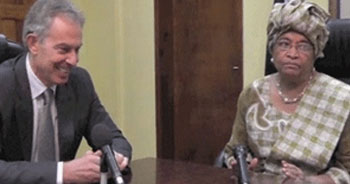Lady Turning

Do these look like two people who’ve just kicked their convictions under the table?
Tony Blair, and Liberian President, Ellen Johnson –Sirleaf met during Blair’s visit to Liberia for the charity the African Governance Initiative (AGI) which, in Blair’s own words aims to “strengthen African governments and help them move to aid independence”. Ms Johnson-Sirleaf, a Harvard economist and alumna of the World Bank and UNDP became President of Liberia in 2005 and is a Nobel Laureate woman praised for her position on human rights and gender equality.
So it came as something of a surprise to hear her defend during this meeting Liberian legislation which penalises gay people. (The current law would sentence anyone convicted of sodomy to a year in jail. New laws are being considered which would send anyone seducing a person of the same sex to jail for five years, and anyone attempting to marry someone of the same sex to ten years.) One only has to read the comments under the YouTube videos of the meeting, to see how polarised the response has been: from some (mostly claiming to be Liberians) in full support of Sirleaf’s “moral” stance, to others calling for her to forfeit her Nobel Prize.
So what is Johnson-Sirleaf’s true position on this matter? The Guardian article reports that on the one hand she will not veto the current law which penalises sodomy; and on the other that she will not sign into effect the proposed bills to impose tougher sentences on gay relationships. This places her in something of a gay grey area. We wait for a straight-to-the-point statement from the Presidential office, confirming Johnson- Sirleaf’s positio one way or the other.
Why is it that Sirleaf is refusing to veto the current law? Whom she is trying to please? Some of her Presidential neighbours perhaps? She says Liberians like themselves “just the way [they] are”, yet her presidential campaign (the first time) was mounted on a promise of change, including more government transparency, human rights, gender equality, a ‘war’ in poverty, and an improvement in education. The current sodomy law arguably leads to violence and repression, yet she does not wish to see any change in this area. This is unusual for someone who, in the words of the Nobel Prize committee “has contributed to securing peace in Liberia”.
And what of Mr. Blair who seems so unwilling to tackle the deeper issues in the African continent, in his new role? In his own words he gets to “choose the issues [he] gets into and the ones he [doesn’t]”. The ones he has chosen include tackling malaria (but not HIV/AIDS), strengthening African economies, and creating more infrastructure. Important issues and rather safe ones. As UK Prime Minister he became known for his pro-gay stance, by taking steps such as lowering the age of sexual consent for homosexuals to 16, and introducing the Civil Partnership Act in 2004. Has the controversy of other areas of his UK leadership finally overtaken him, leaving him averse to wading into anything too provocative? (By contrast, both the current UK Prime Minister David Cameron, and US President Barack Obama have made tackling the issues of human rights overseas (including those of gay and lesbian people) something of a priority (even threatening to reduce or withdraw foreign aid to nations which refuse to clean up their rights records)).
The threat of a jail term will not change a gay person’s sexual orientation. It will simply serve to force gays and lesbians into hiding, and have them living in fear and oppression. This is surely not the kind of society that Ellen Johnson-Sirleaf had in mind, when she swore her first presidential oath in 2005.
It is all so ironic for a nation whose name means “the country of the free”…